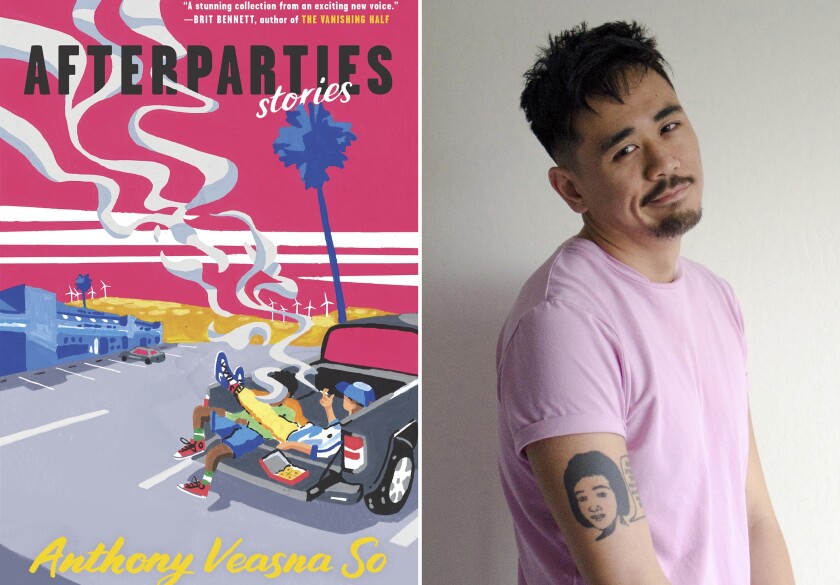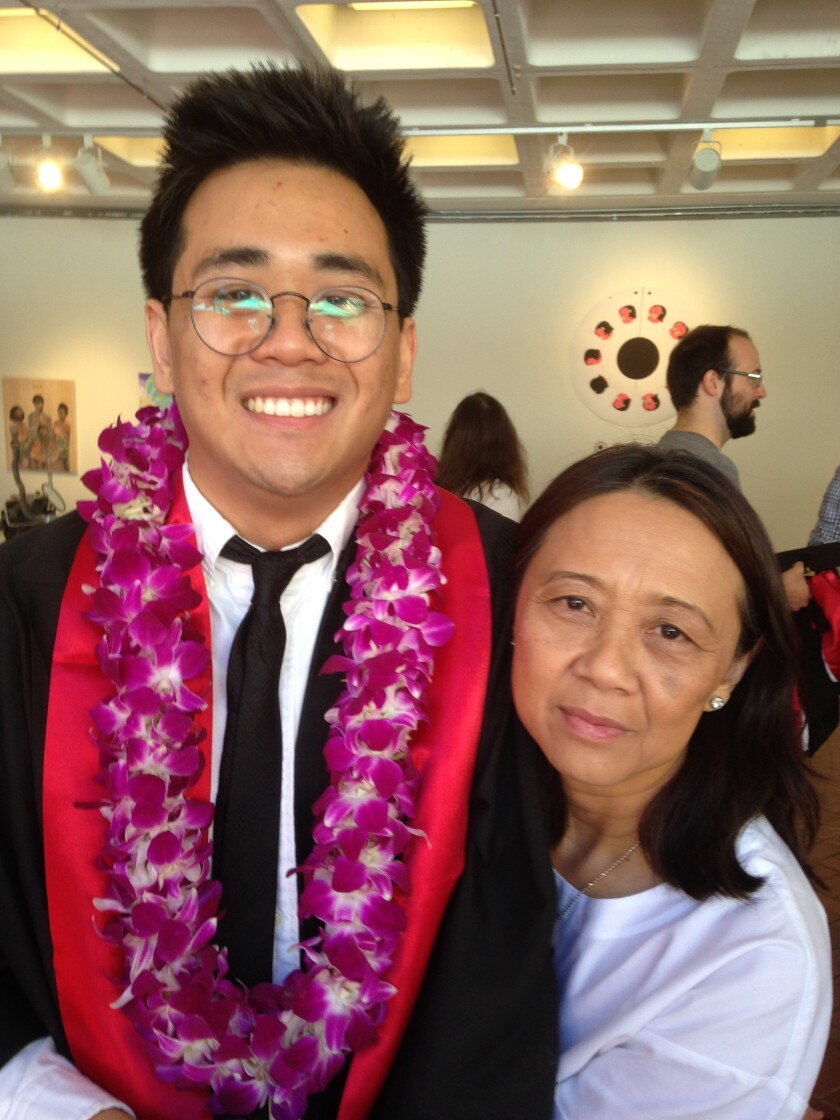On the Shelf
Afterparties
By Anthony Veasna So
Ecco: 272 pages, $28
If you buy books linked on our site, The Times may earn a commission from Bookshop.org, whose fees support independent bookstores.
Like many of the characters in his debut short-story collection “Afterparties,” Anthony Veasna So had a love-hate relationship with California’s Central Valley.
The So kids spent scorching summer days hanging out in air-conditioned malls, babysitting little cousins and cruising around Stockton eating yogurt and burritos, as Samantha Lamb, So’s older sister, recalled. Most days, though, they worked at their father’s auto repair store, the inspiration for So’s story “The Shop.”
Their parents had fled the Cambodian genocide as teenagers before arriving in the U.S. in the early 1980s. “What Stockton gave [them] was the ability to learn and grow,” Lamb said. “It was cheap to live in Stockton, so they were able to achieve their American Dream there.”
But the diverse city of more than 300,000 along the San Joaquin River, home to one of the largest Cambodian communities in the country, was too small for her brother’s talents. “Anthony was always destined to be greater,” said Lamb. “It was very apparent that he was really, really, really smart … and that he was going to do big things.”
So died in December of an accidental drug overdose. He was 28.
Coming out nine months later, the highly anticipated “Afterparties” follows Cambodian Americans living mostly in the Central Valley (deemed the “a—hole of California” by one of So’s characters) — and deals with (among other subjects) reincarnation, the inherited trauma of the Khmer Rouge era, queerness and the intricacies of family.
The author’s unexpected death devastated his peers and mentors, who had felt they were witnessing the beginning of an illustrious career. Mary Karr, George Saunders and Brit Bennett were among the esteemed writers who praised the book early on. Roxane Gay, professor and author of “Bad Feminist,” selected “Afterparties” for her monthly Audacious Book Club. And in homage to So, the literary journal n+1 created the $5,000 Anthony Veasna So Fiction Prize.
Though his life was brief, So left behind both a boldly creative work and a monument to his milieu. The author, also a visual artist who frequently employed collages, crafted his stories directly from life, immortalizing a family, a city and a community underrepresented in fiction.

Author Anthony Veasna So and the jacket of his highly anticipated story collection, “Afterparties,” out in August.
(Ecco Press; Chris Sackes / AP)
His stories also help open a new window onto a culture on the periphery of American consciousness, said Khatharya Um, associate professor at UC Berkeley and the coordinator of its Asian American and Asian Diaspora Studies program.
“Works such as [“Afterparties”] shine light on experiences that have not been at the center of the Asian American narrative,” she said of a new generation of writers. “They are redirecting the popular imaginary to these untold stories, to these experiences that remain, for the most part, invisible. To borrow the words of Helen Zia: those who are ‘Missing in History.’”
Every one of the nine short stories in “Afterparties” draws on So’s real family, Lamb said. “Three Women of Chuck’s Donuts,” which first appeared in 2020 in the New Yorker, was inspired by their “deadbeat” uncle and their late, hardworking aunt, who co-owned a 1950s Americana eatery called Chubby’s Diner. “We Would’ve Been Princes!,” about family tensions that erupt during an epic drunken wedding, came out of Lamb’s chaotic two-day nuptials. “Generational Differences’’ is about a mother who escaped both the killing fields and the Cleveland Elementary School shooting of 1989. So and Lamb’s mother, Ravy, a retired claims representative for the Social Security Administration, survived both horrors.
Alex Torres, So’s partner, remembers how many of the stories came together inside their San Francisco home — with So sometimes deep-cleaning their apartment before getting down to business on his beanbag chair or their “horribly stained” white couch while downing caffeine, then hitting the gym.
“Watching him revise was always a very painful process,” Torres said, laughing. “He was very much a perfectionist. … Every single drop mattered in his painting, and he felt the same way about writing.”
Torres was more than a passive observer of his partner’s creative process. “I would kill any bad stories right away,” he said. He also helped with line edits, read and reread stories and inspired characters and quotes — as in “We Would’ve Been Princes!,” when Bond (based on Torres) snatches a joint from his brother Marlon (that’s So) and says: “You don’t deserve this, and also you shouldn’t have it.”
“I literally said that to him verbatim,” Torres recalled.
Though the stories pull from personal experience, they cover a lot of ground. When Helen Atsma, Ecco Press’ vice president and editorial director, first read So’s work, she was awed by his ability to write from so many perspectives without telling the same story twice.
“I think that was very important to him, to explore the range of humanity within a context that is shared,” she said, touching on the genocidal history that links the stories together. “Humor was really important to him. He wanted people to laugh. And I think this is very much a collection about not only surviving but living and grasping on to it.”
Growing up, Lamb learned that Cambodians coped with the genocide in two ways: They either didn’t talk about it, or “every single moment was a lesson from the genocide,” she said.
So’s parents were definitely among the talkers. His father, Sienghay, spoke of burying his own father after he died of dysentery the day before Vietnamese troops overthrew Pol Pot’s regime. Ravy shared tales of her father, a rich rice factory owner whose intestines were cut out in a mango field. “Those are the types of stories we were told as kids,” Lamb said.

Anthony Veasna So with his mother, Ravy So. Many of his stories drew on his upbringing among Cambodian refugees.
(Samantha Lamb)
In “The Shop,” a father lectures his grossed-out kids about durian, the famously pungent fruit: “Anything you can eat you should be eating. You think every meal we had during the Khmer Rouge was smelling right?” To which one of his sons responds: “Ba, you gotta stop using the genocide to win arguments.”
Wherever So went, he carried these stories with him. After graduating high school as salutatorian, he went on to Stanford to study computer science but wound up studying art and literature. Later he worked as a teacher and applied to Syracuse’s MFA program.
Jonathan Dee, a Syracuse professor, plucked So’s application from the pile and encountered “Maly, Maly, Maly,” about two cousins waiting to “celebrate the rebirth” of Maly’s “dead mother’s spirit in the body of [their] second cousin’s baby.” Much of the story takes place in a Stockton video store.
“You just knew that you were hearing a voice that you hadn’t heard before,” Dee said.
While at Syracuse in 2018, So dropped into the offices of n+1 to introduce himself to Mark Krotov, its publisher. The outlet eventually published “Superking Son Scores Again” — the most “Stockton” story So had ever written, he once said, about the defining elements of his youth: “badminton, Cambo grocery stores, inherited trauma, pursuing your passions when your whole world is at siege.” It won the Joyce Carol Oates Prize in Fiction.
“‘Superking Son Scores Again’ is Anthony at his most Anthony,” said Rob McQuilkin, So’s literary agent. “It’s like all eight cylinders, just powering down a runway of manic brilliance.”
McQuilkin took So on as a client after reading the piece. In a two-book deal, he sold “Afterparties” and a planned novel to Ecco Press for $300,000. So called home and told his mother about the deal. “Mom, don’t drop the baby!” he shouted, as Dee recalled.
At the time of his death, So was working on a novel titled “Straight Thru Cambotown.” Ecco will instead publish chapters of the work, alongside some nonfiction, in a book planned for 2023, McQuilkin said.
As the publication of “Afterparties” neared, So’s friends and family shared bittersweet emotions.
“It’s such a loss to those of us who knew him personally and to people who care about the future of American literature,” Dee said, “but I hope that will be acknowledged and then put aside, because one great book is a really worthy legacy.”
window.fbAsyncInit = function() { FB.init({
appId : '134435029966155',
xfbml : true, version : 'v2.9' }); };
(function(d, s, id){ var js, fjs = d.getElementsByTagName(s)[0]; if (d.getElementById(id)) {return;} js = d.createElement(s); js.id = id; js.src = "https://connect.facebook.net/en_US/sdk.js"; fjs.parentNode.insertBefore(js, fjs); }(document, 'script', 'facebook-jssdk'));
Stay connected with us on social media platform for instant update click here to join our Twitter, & Facebook
We are now on Telegram. Click here to join our channel (@TechiUpdate) and stay updated with the latest Technology headlines.
For all the latest Entertainment News Click Here
For the latest news and updates, follow us on Google News.
